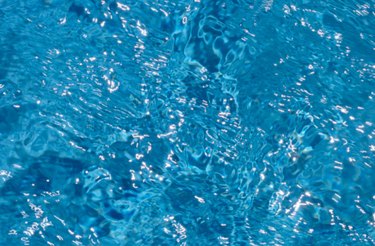
Saltwater pools use regular table salt to produce chlorine instead of using pucks or powdered chlorine. When it comes time to drain all that salty water, where is the best place for it to go? The best part about a saltwater system is that the salt never evaporates with the water, but that also means draining the pool into your yard will leave pounds and pounds of salt behind after the water evaporates or absorbs into the soil.
Saltwater Pools
Video of the Day
While it is true that the saline level in a saltwater pool is relatively low compared to the ocean, all that salt has to go somewhere. To achieve 3,000 ppm salinity, you had to disperse approximately 25 lbs. of salt for every 1,000 gallons of water. Small amounts of salt — such as water splashed out or backwash — will not harm the grass around the pool. However, if you plan on draining it, you need to drain in stages and into an approved location.
Video of the Day
Draining on Grass
While the water itself may not hurt your grass, the leftover salt just might. Imagine that you want to drain a small pool with only 2,000 gallons of water. That is still 50 lbs. of salt. Draining into one area of the yard can allow that salt to be absorbed into the ground. Salt in small quantities will not kill grass, but salt in the soil will absorb moisture and nutrients until it is no longer able to sustain growth.
Draining on Property
Most municipalities permit the draining of your pool onto your own property as long as it will not affect the neighbors. If you can drain by using the water to irrigate your landscaping, you can increase your chances of spreading the salt around enough not to congregate in one place. The best choice for you, your neighbors and your landscaping is to drain into the sanitary sewer, or clean-out line.
Gutters and Storm Drains
It is never recommended that you drain into the storm drain system if you have a saltwater pool. Storm drains and gutters drain directly into local bodies of waters, such as streams, rivers and lakes. Saltwater and other chemicals needed to sustain pools are harmful to local wildlife and your area's ecosystem. A byproduct of saltwater pools is the organic pollutant bromoform, which affects the brain, liver and kidney function in animals. Draining this, along with all the salt, into a nearby stream can cause the salt content around the drain site to rise to dangerous levels, killing local plants and wildlife.